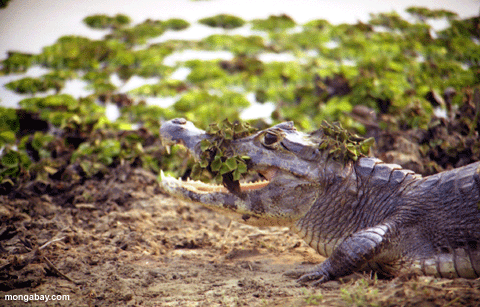Pantanal wetland in Bolivia threatened by port project says WWF
WWF news release
November 20, 2005
Santa Cruz, Bolivia Plans for the construction of a commercial port and railway access line crossing Bolivia’s Otuquis National Park — a protected area and Ramsar site located in the heart of the world’s largest wetland area, the Pantanal — must be radically restructured so that it doesn’t cause irreparable environmental damage and economic losses, warns WWF.
The proposal from the Bolivian Railway-Port Society, and backed by sectors of the Bolivian government, considers opening a port at the mouth of the Bolivian shore of Paraguay River to link landlocked Bolivia to the Atlantic Ocean as a national priority. However, the plans are seriously flawed according to a report published by WWF Bolivia, the Earth Institute at Columbia University and the New Zealand Crop and Food Research Institute.
“If Puerto Busch goes ahead, one of the most species-rich wetlands in the world will be threatened,” said the report’s scientific coordinator, Stephan Halloy.
“We could see another costly ruin scarring the landscape, just like in the 1970s when a previous port and elevated road in the same region were swamped by floods leaving it unuseable. The port and railway embankment will obstruct natural waterflows and disrupt the movement of endangered species, drying out some wetlands while increasing flooding in other areas.”
 Caiman in the Pantanal. Photo by R. Butler Related: |
The Puerto Busch Study: Options for the location of a sovereign port for on the Paraguay-Paraná River System, shows that the plan to construct the multi-million dollar port is based upon a flawed Environmental Impact Assessment (EIA), which was officially approved last December. For example, the EIA and the design ignore the fact that water levels in the region can rise close to five meters above ground level, which would flood the prospective railway link and render the port useless. The study proposes an alternative location for the port at the Cáceres-Tamengo river System, which is also part of the Paraguay-Paraná System and runs into the Atlantic.
“This site minimizes the impact on the environment while also offering a better investment opportunity,” said Roger Landivar, WWF Bolivia’s country representative.
As a result of the dissemination of the study since October, WWF has been formally asked to close its field office in the ecoregion, located in the municipality of Puerto Suárez, as well as cease activities there. This municipality covers approximately 24 per cent of the Bolivian Pantanal ecoregion. However, WWF Bolivia’s Pantanal Program will continue working within the municipalities of San Matías and Puerto Quijarro.
This is a modified news release from WWF.